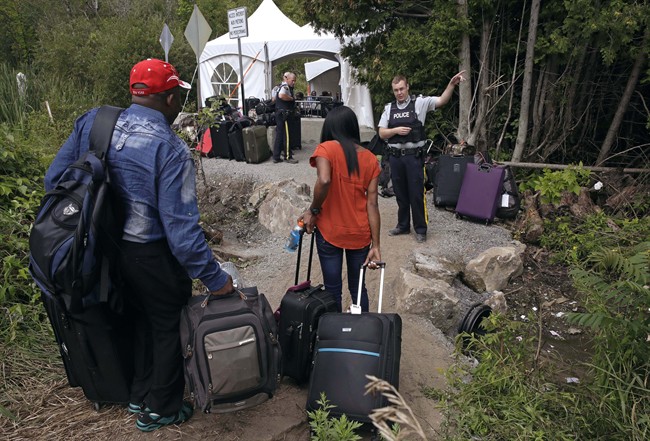The Canadian government says it will be ready to handle any new influx of irregular border-crossers following a policy decision in the United States that could send more people fleeing north.

On Monday night, the Trump administration confirmed that it will end temporary protection status (TPS) for citizens of Nicaragua, many of whom have lived in the U.S. for nearly two decades. About 2,500 people are expected to be directly affected.
WATCH: Manitoba asylum seekers wait to hear if they can stay
_MMC04MHR_tnb_1.jpg?w=1040&quality=70&strip=all)
At the same time, acting Secretary of Homeland Security Elaine Duke said that her department will wait until July 2018 before deciding whether to end the TPS program for a much larger cohort of 57,000 Hondurans.
A renewal for Honduras is considered unlikely by the Canadian government, however.
“I had the opportunity to discuss this directly with (Duke) two or three weeks ago at the G7 meeting in Italy,” Public Safety Minister Ralph Goodale told reporters outside the House of Commons on Monday afternoon.
“She undertook at that time to give us maximum notice of policy changes in the United States if they were to come about.”
It’s unclear how much notice Canada received ahead of Monday night’s announcement.
On Tuesday, a spokesperson for Immigration Minister Ahmed Hussen’s office reiterated that the government is doing everything possible to avoid being caught off guard.
“This is an ongoing and developing situation and we are aware that the potential exists for more people crossing the border,” wrote Hursh Jaswal. “We have contingency plans in place to deal with various possible scenarios.”
He added that Ottawa “has developed a national operations plan that will be used by all federal departments in the event of a significant increase in the number of irregular border crossings and the number of refugee claims.”
Why TPS matters for Canada
The TPS designation allows foreign nationals who are already in the U.S. to remain there as long as their home country is deemed unsafe due to temporary factors like armed conflict, natural disaster or epidemic.
That is no longer the case for Nicaragua, the U.S. government has determined. Nicaraguans were initially granted TPS in the U.S. in 1998 following the devastation of Hurricane Mitch, and their status has been renewed over and over again in the two decades since.
They will now have 12 months to pack their bags and leave the country, or face deportation. At least some could head north to avoid having to return home.
In an intelligence report obtained by Global News in September, the Canada Border Services Agency (CBSA) warned that “if TPS designations are not renewed, the number of (asylum claims in Canada) for the impacted countries is likely to spike.”
Ports of entry in Quebec, southern Ontario and the Pacific region “will likely be impacted most,” the report noted.
WATCH: Border officials brace for another spike in asylum seekers crossing into Canada

The next year could, therefore, bring additional challenges for the CBSA. While the number of Nicaraguans affected is small, TPS status is also set to end for citizens of Haiti in January. That will affect about 46,000 people, and Canada already saw a large influx of Haitians crossing into Canada seeking asylum over the spring and summer months.
But the biggest group of TPS-protected people in the U.S. are the 200,000 citizens of El Salvador, whose protected status will expire in March. As with Honduras, a renewal is not considered likely.
System still backlogged
Following a spike in irregular migration this year, the Liberal government began reaching out to diaspora communities in the U.S. in an attempt to dispel myths about the ease of coming to Canada and gaining refugee status.
The House of Commons Standing Committee on Citizenship and Immigration heard recently that social media has been a huge driver of the movement north for Haitians in particular. Officials testified that they’ve seen entire families packing up and heading to the Canadian border based on a tweet or Facebook post.
Goodale has maintained that there is “no free ticket to Canada,” and the number of crossings has dropped significantly since August.
WATCH: How the feds plan to house asylum seekers entering Canada as winter approaches

If asylum seekers cross the border away from a designated checkpoint, a loophole in the Safe Third Country Agreement between Canada and the U.S. means they can claim asylum here, even though they were in the U.S. first.
A backlog has quickly developed at the Immigration and Refugee Board, which determines eligibility to claim asylum, as the number of new claims has climbed into the thousands.
READ MORE: Asylum seekers get health-care benefits first, eligibility questions later
Asylum seekers are subject to a security check and background check as soon as they arrive. But according to documents recently tabled in the House of Commons, not a single claimant who crossed into Canada this year has been turned back due to security concerns.
— With files from the Associated Press
- Canadian man dies during Texas Ironman event. His widow wants answers as to why
- On the ‘frontline’: Toronto-area residents hiring security firms to fight auto theft
- Honda’s $15B Ontario EV plant marks ‘historic day,’ Trudeau says
- Canadians more likely to eat food past best-before date. What are the risks?




Comments